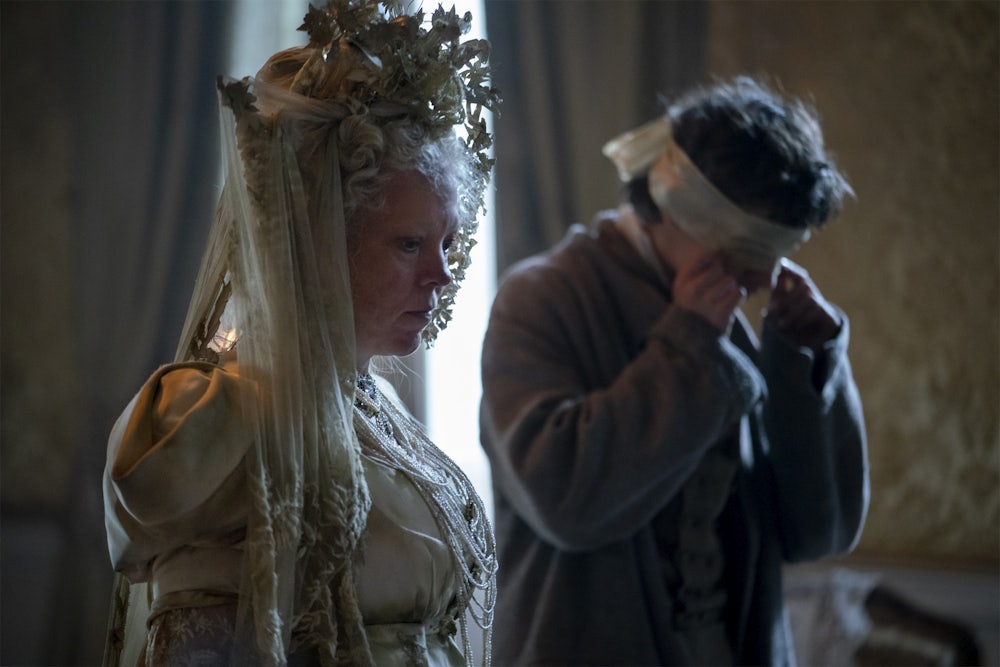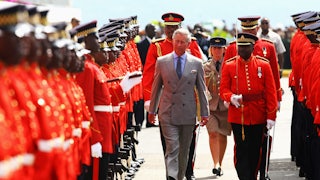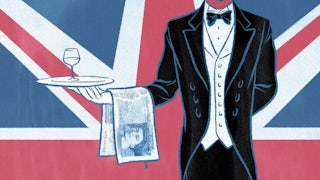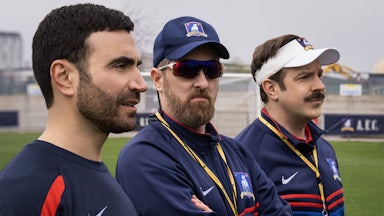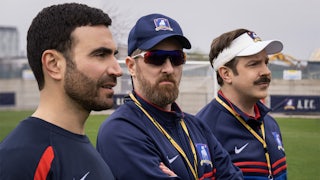Pip says “fuck.” It happens in the second episode of Steven Knight’s new miniseries adaptation of Charles Dickens’s Great Expectations, airing now on FX and streaming on Hulu. Pip’s in a fistfight with current rival, future buddy Herbert Pocket. Herbert’s overmatched, but he keeps peskily coming at Pip, so Pip shoves him to the ground, shouting, “Will you just fucking stop?” The scene grinds to a halt. Estella, the girl both boys love, turns to Pip and says, “Oh. Will you teach me that word? My vocabulary is evidently lacking.” Pip apologizes—for cussing, not laying out Herbert—and stalks away.
I’d be lying if I said I didn’t do a quick “Find” search of Project Gutenberg’s full text of Dickens’s novel, looking for the f-word. But, much as I suspected, no fucks were given. The scene, like many in Knight’s miniseries, is not new—Herbert and Pip do indeed resort to fisticuffs in Dickens’s original. But it is nastier, more vulgar. Indeed, aesthetically, vulgarity is the watchword for this new production. The moments Knight adds to the narrative are invariably more explicitly violent or crude or crudely direct in their illustration of Dickens’s themes. And the famous moments Knight dutifully adapts all tend to have their crassness dialed up. The world of this Great Expectations is gross and stinky and muddy and vile. The whole of England, the whole of the world, is as gnarly here as Miss Havisham’s decaying mansion; it’s only the social fictions of class that allow the characters to pretend otherwise.
But is that all? Whenever there’s a new TV or film adaptation of a classic work of literature—especially one that’s been so frequently adapted as Great Expectations—it’s fair to ask why. Is it just a stylistic update, a periodic remake designed to reflect contemporary trends and styles in TV or film? Is the new adaptation adding to or revising the original text in a provocative way? Is it set in the present, in the future, in Nazi Germany, in space? Or is the new take built around an actor at the peak of their powers who seamlessly fits an iconic role? I’ll admit this was my guess as to why FX and the BBC had embarked on an expensive new adaptation of this particular Dickens: the irresistible notion of Olivia Colman in Miss Havisham’s wedding dress.
And that’s not entirely wrong, but it’s actually Pip’s “fuck” that’s closer to the heart of this new reenvisioning. That does not mean that Steven Knight—who created Peaky Blinders and previously adapted A Christmas Carol for FX—mounted a new production of this novel because previous versions weren’t dirty enough for his liking. But the source of all this dirt proves conceptually central to the miniseries. Like our new Pip, this Great Expectations is impolite. It’s impolite in terms of its vocabulary, in terms of its relatively graphic violence, and in terms of the number of naked butts we see on-screen. But it’s most crucially impolite in terms of what it is willing to say explicitly about the world of Dickens’s story. In particular, this Great Expectations is willing, even eager, to use the c-word: colonialism.
Great Expectations, if you’re unfamiliar, is the story of an orphaned boy growing up in Kent in England, raised by his mean older sister and her kindly blacksmith husband, Joe. Despite these humble origins, Pip dreams of success, of becoming a “gentleman.” That opportunity is presented to him at a young age when he lucks into the patronage of Miss Havisham, a terrifying eccentric who lives in a rotting mansion and hasn’t taken off her wedding gown since she was jilted at the altar. She brings Pip to her home in order to serve as a companion or foil or plaything for her adopted daughter, Estella, to whom she offers instruction in the art of making men miserable. Only when Pip comes into a mysterious fortune, and is whisked away to London by the enigmatic Mr. Jaggers to continue his education, is he rescued from Havisham and torn away from his great love, Estella.
In Knight’s adaptation, this arrangement is much the same as it is in the source material, but everything from Pip’s early aspirations to Havisham’s wealth to Jaggers’s business is couched in the explicit terms of imperialism. Before he’s even met Havisham and Estella, the young Pip tells Joe that he aims to leave this village to see London and the world. His eyes, he says, are “looking east, down the River Thames that flows past these tiny parishes, to the empire. Our empire.” It’s a bit of a jarring moment, but it’s only the first of many. Indeed, he blathers about his imperial ambitions so much that, at one point, Knight has Havisham roll her eyes and say, of Pip, “Oh, how he loves the empire.”
But Pip’s corruption and disillusionment also take imperial form. Early in the series, Knight adds a scene in which Pip nobly refuses to sell manacles to a ship’s captain if he intends to use them to transport enslaved Africans to the Americas—only if the manacles are used for prisoners. Later, Havisham—who smokes opium like a chimney—arranges a mock ball for Pip and Estella to practice their manners and their dance steps. She sets the scene: “a beautiful society ball, built by my father on the proceeds of indigo, opium, and slaves.” One of her cruelest tricks is making Pip earn the money for his first gentlemanly suit by selling a bag of premium opium at the docks to the same slaver he’d refused earlier. This Pip deals drugs! The slaver himself is the one to point out the contradiction in this. Pip frames his gentlemanly dreams as part and parcel of England’s imperial project, but the more he learns about how the empire works, what ignoble sacrifices it requires, the less appealing it (and his gentlemanly status) becomes.
While these frequent exclamations about the imperial origins of all this money might seem conspicuous, they’re not exactly foreign to the text. Dickens did not highlight them in this way, but the society about which he wrote was absolutely built upon the colonial economy and all of its violences. The great postcolonial scholar Edward Said began his influential 1993 book, Culture and Imperialism, with a reading of Great Expectations along these lines. The separation between the fates of Dickens’s characters and the imaginative infrastructure of the British Empire, Said suggested, was always a convenient fiction. From the Australian origin of Pip’s inheritance to Pip and Estella’s dreams of Cairo, to Pip’s ultimate future as a businessman in “the East,” the novel’s plot is one enabled by and expressed through the circuits of the empire. Knight’s anti-colonial critique in this show is not a particularly complex one, but it’s one that builds upon this well-established reading of the original source material. Pip’s ultimate transformation—in the book as well as the series—is the product of an economy and a class system that owes everything to the sins of the empire. Knight just makes a point of saying so.
This Great Expectations does not, however, always sustain a tight focus on its anti-colonial critique, nor does it exactly express that critique with the subtlety of Said. Aside from characters just straight-up saying it sometimes, Knight’s anti-colonial interpretation of the material is mostly couched in a broader aesthetic of theatrical grit. Everyone, truly everyone, who is even indirectly complicit with the imperial economy is rendered grotesque and exposed. They’re revealed to have adulterous BDSM affairs, they snort American tobacco like dirty little piglets, they drink rum and smoke opium to excess because they know there’s plenty of supply from the Caribbean and from China. (One of the few characters left unscathed by this toxicity is Pip’s childhood pal Biddy who at one point simply announces, “I’m a Chartist!”) The show’s thesis is that the empire is a poison tree, and the way it expresses that thesis is by making sure we’re aware how tainted all of its many fruits are.
There are moments, especially as the show progresses and Knight gains a freer hand with the material, when the intensity of this aesthetic can become histrionic, even laughable. Mr. Jaggers, for instance—played gamely by Ashley Thomas—is transformed from a cold, savvy father figure into a growling, hulking bully of a mentor who boastfully self-identifies (on multiple occasions) as “evil.” He barks his advice about becoming a gentleman inches from Pip’s face, as if he’s Michael Scott’s woefully misguided “Prison Mike” character on The Office, dispensing scared-straight lessons to potential white-collar criminals. At one point, Jaggers tells Pip that he’ll need waterproof boots to walk through “rivers of blood.” He means this literally—their next appointment is in a slaughterhouse—but also, you know, figuratively. It’s all a bit much.
In moments like these, the show can look like a relatively standard Dickens adaptation with a Peaky Blinders Instagram filter applied on top of it. And, while its crudity is certainly purposeful, its sense of purpose can be elusive at times. For as conceptually invested as it is in uncovering the tendrils of empire, for instance, this show—which has cast many nonwhite actors in central roles—seems to have simply chosen not to figure out how racism might have worked in its storyworld. Knight likes the blunt version of the story, and sometimes that bluntness can become dullness.
But you get used to it. While these over-the-top arias can be distracting at first, they eventually just become part of the vernacular. Knight skillfully and unobtrusively parcels out Dickens’s story so that it has the pace and narrative organization of a contemporary serial drama. That story remains an alternately enraging and heartbreaking one, and most of the excellent cast understand their assignment, bringing a twenty-first-century foul mouth to the iconic eccentricities of these immortal “Dickensian” characters. Colman is predictably great, imbuing a kind of flailing lustfulness to Havisham’s cruelty; Shalom Brune-Franklin shows the cracks in Estella’s icy façade; Matthew Needham turns Bentley Drummle into a hilariously menacing fiend of an antagonist; and Matt Berry’s smooth-talking Mr. Pumblechook is an instant classic—the role he was born to play.
This Great Expectations is pulpy and preposterous, intentionally inelegant, virtuosically unsubtle. It carries all the force of a blacksmith’s hammer in order to pound a relatively nuanced variation of the story. For this reason, it’s loud and violent, but it ultimately gets the job done. It’s not always pretty, and it can stink to high heaven, but, in the end, it’s honest work.
